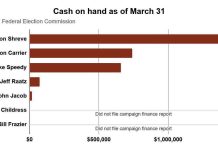Have you ever wondered when you recycle just where your items end up, and how they are reused?
Heather Siesel, director of the Bartholomew County Solid Waste Management District, said much of the county’s recyclable material is picked up by West Rock.
Based in Atlanta, the packaging company had $14.86 billion in revenue in 2017 and operations in dozens of countries, including the U.S., Canada, Brazil and China.
The company has seven facilities in Indiana, including one on State Street in Columbus that manufactures corrugated containers.
WestRock primarily picks up cardboard, paper and some plastics from Bartholomew County, according to Pat Coppedge, a procurement representative at WestRock in Indianapolis. The material is then sent to Indianapolis to be sorted.
“The cardboard we pull from Columbus, we take to our Eaton mill,” Coppedge said. “They make partition paper out of it. That’s the partition you would see if you bought a case of wine or a case of dishes.”
Eaton is located about 20 miles north of Muncie. The company operates 13 consumer packing mills in the U.S. The Eaton facility has an annual production capacity of 64,000 tons, according to the company’s 2018 annual report.
“(Plastics) go to a processor to be shredded or ground up and made into pellets and then sold to a company that uses those to make more plastic products,” Coppedge said. “Once I send it to the grinder, they sell it off to whoever. I’m not sure who the end users are.”
Coppedge said the lion’s share of the plastics that WestRock collects is shipped KW Plastics, an Alabama-based recycling firm that claims to be the world’s largest recycler of plastics.
Scott Sanders, general manager of KW Plastics, said the company buys recyclable material from several countries.
“We bring that material in from all over the U.S., Canada and Mexico, and sometimes, the Caribbean,” he said. “We wash that material and make it into a post-consumer resin.”
Many of the clear or opaque juice and milk bottles that KW Plastics receives end up being sold to laundry detergent bottle manufacturers, Sanders said.
Plastics with added color pigment are made into a black resin and then sold to a wide-variety of companies to make automotive parts and agricultural tubing. Yogurt bottles, cottage cheese containers and much of what is found in the dairy section of the grocery store, are often turned into paint barrels or automotive parts.
“We sell to intermediate molders,” Sanders said. “The ultimate customer is going to be your Proctor and Gambles, Cloroxes and Unilevers. All the big brands are asking for recyclable materials.”
The path that recyclable materials take from the city of Columbus is slightly different. In 2015, the city signed a contract with Ray’s Trash Service to to transfer and process all the recyclable material from the city’s curbside pickup program.
Under the terms of the agreement, the city delivers the recyclable material to a transfer station that Ray’s rents at Nugent Sand Co.
Ray’s then takes the materials to its regional sorting facility in Indianapolis, according to Calvin Davidson, general manager of Ray’s Trash Service. Several communities in the Indianapolis metropolitan area have contracts with Ray’s, including Brazil and Shelbyville.
“There’s middle people in between (us and the end-user),” Davidson said. “When we sort it out, we make large bales of similar materials. Some customers take it and grind it up and melt it down into b.b.-sized pellets and sell it to people who make stuff.”
He said the company processed around 200,000 tons of recyclable materials last year. He said around 99 percent of the material is sold to companies in the Midwest.
Davidson said Ray’s Trash Service sells some bales of steel cans to Nucor, a New Jersey-based manufacturer, to make sheet iron for cars and rebar that is often used to reinforce construction projects.




